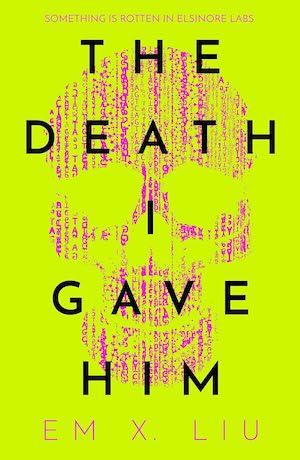In The Death I Gave Him, Em X. Liu reimagines Shakespeare’s famous tragedy Hamlet as a queer, near-future sci-fi thriller. Hayden, our new Hamlet, finds his scientist father brutally murdered. Years before, Dr. Lichfield founded Elsinore Labs and developed a neuromapper that could replicate “your ongoing thoughts, your way of thinking, everything that makes up who you are.” Hayden, meanwhile, had been working on his Sisyphus Formula that he hoped would one day help him achieve literal immortality. After the body is discovered, the lab is locked down. Hayden has no idea who the killer might be: his Uncle Charles, head of security Paul Xia, Paul’s daughter and Hayden’s coworker and ex-girlfriend Felicia, or lab tech Rasmussen.
As Hayden pursues increasingly drastic and dangerous acts to expose the murderer, the body count rises. Felicia, desperate to extricate herself from the tangled webs woven by Hayden and the killer, enacts her own plans for revenge. Hovering over it all is Horatio, an artificial intelligence embedded in Elsinore Labs. He only wants to protect Hayden in the way he failed to protect Dr. Lichfield. But even he cannot escape Hayden’s vortex. At this rate, it would take an act of god for anyone to make it out of Elsinore alive.
This is a challenging book to review. It’s fractured and withholding in intentional ways that make for a powerful reading experience but a little difficult to define. Liu structures their novel not in a way many readers are used to but through compiled interviews, records, correspondence, and documents. It’s both distanced and intimate.
Buy the Book


The Death I Gave Him
I didn’t love the cover copy pushing the locked-room murder mystery aspect; it’s hard to build any sort of whodunit suspense when the original play was written some 420 years ago and most of Liu’s readers would have read it back in high school. It’s a little like asking people to be surprised if a retelling of Much Ado About Nothing featured the updated versions of Beatrice and Benedick falling in love. Nevertheless, the plot was more suspenseful than I anticipated, particularly toward the end where Liu tossed in several shocking twists.
What did surprise me was the depth Liu gave to Felicia. Ophelia’s storyline always infuriated me. She’s written as a young woman held up as a beacon of virtue and innocence who is totally beholden to the men in her life. It frustrated me how little agency she has in the play, how she and Gertrude are the only women and both are bound to terrible men so much that it leads to their deaths, and how she never has the opportunity or seemingly even the interest in standing up for herself. Shakespeare wrote other complex women, but his version of Ophelia felt hollow to me. Liu’s Felicia is a blend of siblings Ophelia and Laertes. She is used by Hayden and Charles and is using them both in turn. She is decisive in her actions and analytical in her thought process. She’s fully aware of what she’s getting herself into, what she wants, and what she’s willing to do to get it. She does not wilt under the pressure put on her by Hayden and Charles. While Ophelia is acted upon, Felicia acts. In short, Liu gives her actual things to do instead of just getting fridged.
I also appreciated the exploration of Hayden and Horatio’s relationship. In the play, the men are good friends from their time in Wittenberg, Germany. Horatio largely keeps out of the drama and bloodshed but gives Hamlet someone to talk to and hash out ideas with. He functions more like a voice of reason, even though no one listens to him as much as they should. And though this shouldn’t be a spoiler, he’s one of the only characters to survive at the end. The Horatio of the novel shares the same DNA, but he’s much more involved in Hayden’s shenanigans. This Horatio may be AI, but Hayden treats him like a living, breathing man. Hayden uses he/him pronouns for Horatio, and even Horatio himself longs for a body in much the same way (and for similar reasons as) poor little mermaid Ariel longed for legs. Their relationship is codependent and a little bit toxic but also unexpectedly provocative.
One of the things Shakespeare does so well is portraying the impulsivity of youth. The scholarship disagrees as to how old Hamlet really is. Some of the dialogue implies he’s around thirty, but other characters refer to him in ways that make him sound like a young man. Certainly his behavior is closer to that of sixteen-year-old Romeo, all hot-heated youth and reckless abandon, than thirtysomething-year-old Benedick, who is experienced enough to think about a situation before throwing himself into it, even if both ultimately fall to hormones and the heat of the moment. In The Death I Gave Him, Liu puts Hayden in his early twenties, a great choice. It makes his chaotic behavior more believable and gives him fewer options outside his father’s orbit to fall back on. He’s still very much a boy looking up to his hero of a father rather than a grown man who might see himself as his father’s colleague or work peer.
In my opinion, a lot of people are too precious about Shakespeare adaptations. I will go to my grave insisting that Baz Luhrmann’s Romeo + Juliet is one of the best filmed adaptations because it really gets the vibes Shakespeare was going for. Viewers who don’t pick up on the layered complexity of the Elizabethan-era dialogue can still understand the tenor of what’s happening and why. Likewise, Em X. Liu’s Hamlet update moves everything from an ancient castle to a futuristic laboratory and lathers on queerness and racial diversity, but the original themes remain. Shakespeare wouldn’t understand many of the concepts, but he’d see the heart of his play beating under this new skin. I think he’d get a kick out of The Death I Gave Him.
The Death I Gave Him is published by Solaris.
Alex Brown is a Hugo-nominated and Ignyte award-winning critic who writes about speculative fiction, librarianship, and Black history. Find them on twitter (@QueenOfRats), bluesky (@bookjockeyalex), instagram (@bookjockeyalex), and their blog (bookjockeyalex.com).










